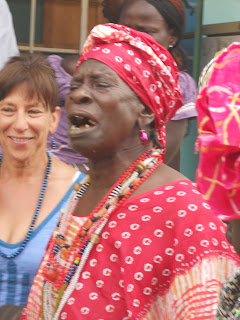
These last few days here I've been trying to to soak up every minute of left. I'm still going to the hospital each morning and absolutely love it. One thing I've always wanted to do in Africa is make really good friends with some local women. There's nothing like a sick baby to unite two people. The mothers at the hospital are generally around my age or younger and want to know all about my culture and if I would PLEASE marry their son. I always tell them "Absolutely, but first we have to get him over this pneumonia and maybe grow for another 20 years!" My responsibilities at the hospital are increasing substantially and I'm going to be sad to go.

I've only been working half days at the hospital so I can spend the afternoon enjoying the last of my time here. I've spent a lot of time with friends around gorgeous pools at some of the most beautiful resorts here. I've also done a LOT of shopping the last few days. There are a few different types of markets here. Practical markets with food, hardware, clothes and fabric, kind of like Africa's Wal-Mart. And then there are craft markets. They have tons of different vendors all selling the same gorgeous things. I love the craft markets because you can watch the men and women make what they are selling. Men sit outside their stalls carving wood all day to make beautiful animal statues, chairs, masks and other designs. Other men weave on large looms or stretch animal hides over drums they've created. Women piece together necklaces, or sew dresses and bags to display from the trees. It's a beehive of activity and everything they make is beautiful. When I worked at the UN I was able to "window" shop every day on the way to and  from work, promising to return when it was time to go home. This week they have been SO happy to see me coming.
from work, promising to return when it was time to go home. This week they have been SO happy to see me coming.
 from work, promising to return when it was time to go home. This week they have been SO happy to see me coming.
from work, promising to return when it was time to go home. This week they have been SO happy to see me coming. Today I went with my friend Famara to a crocodile pool (everyone here has exciting names like Famara, Modu, Abdukabbir, Fatou, and Fatmata~ I've gotten used to it but they still can't say my name so I go by Binta Jammeh.) To get to the crocodile pool, we wove through miles of dirt roads with open sewers and very old homes peppered in between ramshackle tin compounds. The crocodile pool is a sacred place for infertile women who take a dip in the pool to help them have a child. Despite its obscure location, it has become a bit of a destination place. They have a great museum depicting initiating ceremonies, masquerades, major wars that the Gambia has been involved in, instruments and masks from various tribes, different types of amulets, called jujus, that are used to protect and heal the owner or hurt his enemy, as well as a variety of agricultural and domestic tools. The instruments were my favorite because many of the instruments we use at home have their roots in Africa. Very early versions of banjos, fiddles, guitars, harps, xylophones, flutes and drums all originate here.
The actual crocodile pool was incredible. It was a very small pond with countless crocodiles. I lost count at 25 massive crocodiles, some sunbathing, many swimming around in their mosquito-infested home. I'm not good at estimating length or size, but they were HUGE. In addition, there were countless smaller beasts from tiny babies, that make it difficult to imagine they can grow to be so big, to 5-6 feet long teenagers. There's no fence or boundary between observer and reptile so it was and having a staring contest between countless animals



 Yesterday I went to Banjul, Gambia's capital for the first time. I was expecting lots of big buildings, wide roads and lots of government officials out and about on the swampy island, but I was sorely mistaken. Banjul is a small island formed by the Atlantic Ocean and the Gambian river. It holds significant importance in the formation of the Gambia because in the British fight against France for the area that makes up Senegal and Gambia, the British were able to hold Banjul and the Gambian river. The British were trying to
Yesterday I went to Banjul, Gambia's capital for the first time. I was expecting lots of big buildings, wide roads and lots of government officials out and about on the swampy island, but I was sorely mistaken. Banjul is a small island formed by the Atlantic Ocean and the Gambian river. It holds significant importance in the formation of the Gambia because in the British fight against France for the area that makes up Senegal and Gambia, the British were able to hold Banjul and the Gambian river. The British were trying to 

 Yesterday I went to a true African wedding. My friends, Lucy and
Yesterday I went to a true African wedding. My friends, Lucy and 
